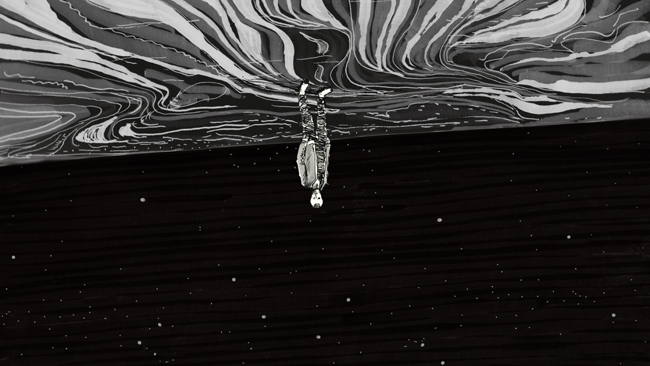Thorns of Immortality
by Patryk Rebisz
Part II (short excerpts) - - - - - - - - - - - - - - - - - - - - - - - - - - - - - - - - - - - - - - - -

4. Man as His Own Master
"Even those philosophical leapses that attempt to transcend the human experience were always rooted in human scale and reality."
"The abstract bodies of the ones who, as they imagined, will welcome them in the future gave a reason to dream about the glory - the history of tomorrow where their names could be forged in stone."
"Without knowing it, the dust of the stone is all they really desired. If they could perceive the process of ageing rock, slowly eroded by weather, would they strive to have their memory ingrained into its molecules that one day will blow across the universe? How many gave up their lives in hopes of reaching eternity only to be forgotten by the dust of history?"
"Anchored in current time and space, if they saw the extremes to which their bodies dictate their thoughts, would they desire to be remembered? If they had a choice, would they risk their life again for that temporality?"
"There was nothing that held them back to history and nothing that connected them to the current reality - it all seemed equally meaningless. Something was brewing under their skins that made them uncomfortable about living."
"The freedom they've found with their spiritual death was uplifting proclaiming: 'As dead - we'll live.' They were 'dead' just like Adam before his finger met that of God's."
"Standing at the abyss of possibilities - man feels frightened at the very idea that now he is his own master. Free to do anything - devoid of any obligation or responsibility - this unbearable lightness to think whatever one wants terrified them."
"The irresponsibility of infinity detached them from the burden of reality."
"Humans are not meant to live like divinities, they rather want to be bogged down by daily responsibility escaping life's troubles into fantasies of what could have happened if only they could reach perfect freedom."
"Devoid of any barriers, they've lost any sense of direction. The fog of uncertainty overtook their minds."
"Looking at the small dots of distant stars - like little pin holes in a black paper dome letting in the outside light - the Poet kept imagining what the outside world looked like. Was God a puppeteer making his next puppet all hollow inside? He wondered if the stars were just holes in the puppet's head waiting for some plebeian hair transplant."
"The Poet desired to flip his mind inside out and in the process envelop the whole world. Like a huge wave from Hokusai's woodcut swallowing up a whole mountain, the Poet wanted to shroud God, in the process destroying Him."
"Reimagined in one's head as a god swallowing up his God - within that one atom a whole new universe could live. Face against the windows, scheming his revenge against the Creator, the Poet could feel the cold emptiness of space."
"What if it's the man giving the gift of life to God? The free will infused into human bodies, almost by accident gave a new meaning to God's existence."
"God was the only source of proof of His existence thus there was always a chance that He could be wrong, that He didn't exist at all, that the Universe was His delusion."
"By giving humans their free will, God cemented His ability to be, for even if people reject Him, in the choice of that renunciation, there is a godliness that defines the Creator."
"It takes a certain amount of determination to look in the mirror and see the true contours of one's face, to rid the self of the disguise, unadorned by superficial needs of the ego. They avoided this mirror terrified that only the illusion of who they are kept them from falling ever deeper into the abyss of despair."
"One lives during their lifetime - not before and only ephemerally after. The end is hazily marked on the timeline of existence but so is one's beginning. One's birth wasn't a surprise - one was meant to exist."
"The question of meaning, the Poet discovered, is incorrect because the answer is within the inquiry. The mere fact of existence gives the answer: one's life is meaningful because one is. Existence spells out meaning."
"The real question is how one should live so that at the end, upon one's death, the soul will transform enough to mark the universe. Search for meaning is not that of existential possibility but rather that of effort and time committed to this inquiry."
|